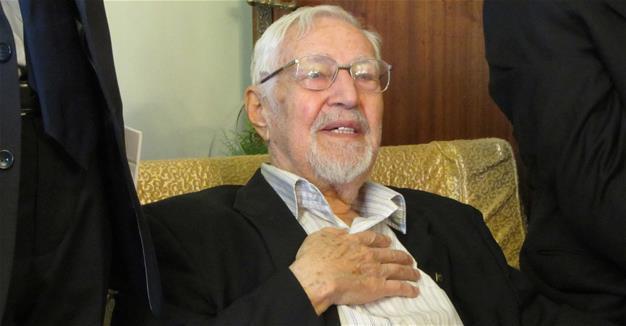Hundreds attend funeral of Iranian dissident politician who died in Turkey
TEHRAN – AP

Hundreds of Iranians on Aug. 31 attended the funeral of Ebrahim Yazdi, one of the country’s most influential dissident politicians and a former foreign minister.
The ceremony took place in a mosque north of Tehran and was attended by many of Yazdi’s political allies as well as ordinary Iranian citizens. His coffin was draped with the flag of the Islamic Republic of Iran and friends acted as pallbearers.
Yazdi died at age 85 on Aug. 27 in Turkey’s Aegean province of İzmir, where he was being treated for complications from cancer after being denied a U.S. visa for follow-up treatment in Houston, Texas, in January. He had worked as a researcher at Baylor College of Medicine in Texas until the mid-1970s.
Yazdi was a close ally of Ayatollah Ruhollah Khomeini, the late leader of the 1979 Islamic Revolution. However, his party, the Freedom Movement, later turned against the clerics as they consolidated power. Yazdi was frequently sentenced to prison on security charges, including an eight-year term in 2012.
A former member of parliament, Yazdi resigned as foreign minister in 1979 in protest of the takeover of the U.S. embassy by militant students who kept 52 Americans hostages for 444 days. Washington later cut diplomatic relations with Tehran.
Yazdi argued that the takeover led to a harsher stance by Washington against Iran’s Islamic Revolution and emboldened former Iraqi dictator Saddam Hussein to wage an eight-year war against Iran, which left more than 1 million casualties on both sides. He was among a small group of politicians who believed the war should have come to end in the early 1980s. It lasted until 1988.
Yazdi was the English-language spokesman for Khomeini during the revolution, both in exile in France and in early 1979 after the toppling of pro-Western monarch Shah Mohammad Reza Pahlavi. Abolhassan Banisadr, the first Iranian president who now lives in exile in Paris, did the same in French.
During his long stay in the U.S. in the 1960s and 1970s, Yazdi established the biggest Muslim association in the country in Houston and earned a reputation for protesting the Shah in various states.
At the funeral on Aug. 31, the crowd occasionally raised the traditional demand for the release of opposition leaders Mir Hossein Mousavi and Mahdi Karroubi who have been under house arrest since 2011.They both challenged the 2009 re-election of former President Mahmoud Ahmadinejad.
Ali Shakouri Rad, a reformist politician who attended the funeral, said Yazdi always sought freedom and pursued peace and reform.
“He is an icon for those things,” Rad said. “And that’s why you see large crowds have participated in his funeral.”
Some Iranian leaders, including President Hassan Rouhani and Foreign Minister Mohammad Javad Zarif as well as former reformist President Mohammad Khatami offered condolence messages after Yazdi’s death.
Yazdi’s body was buried in Behesht-e Zahra cemetery in southern Tehran, home to a shrine to Khomeini and the gravesites of many prominent Iranians.
Yazdi is survived by his wife Sorour Talieh Yazdi, four daughters and two sons.
 Hundreds of Iranians on Aug. 31 attended the funeral of Ebrahim Yazdi, one of the country’s most influential dissident politicians and a former foreign minister.
Hundreds of Iranians on Aug. 31 attended the funeral of Ebrahim Yazdi, one of the country’s most influential dissident politicians and a former foreign minister.